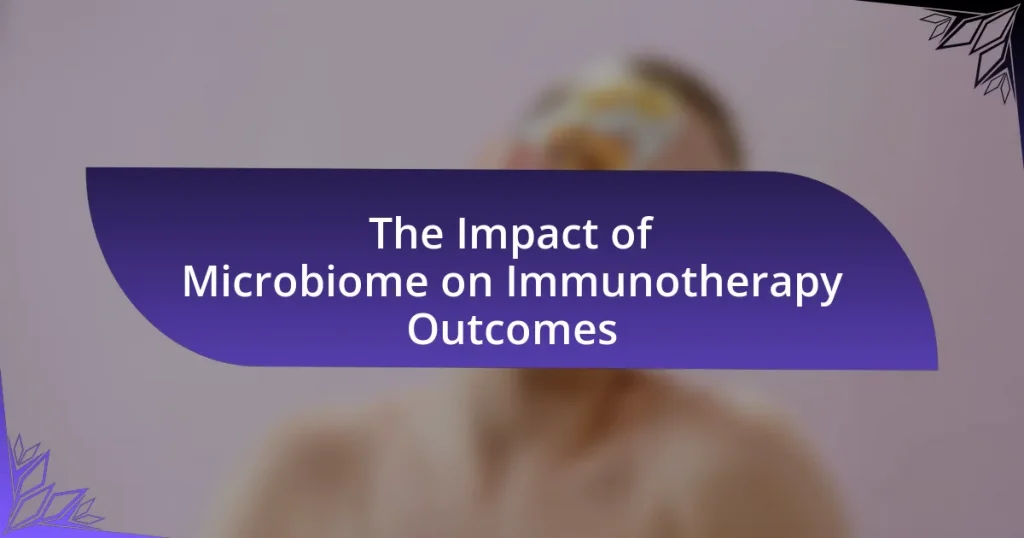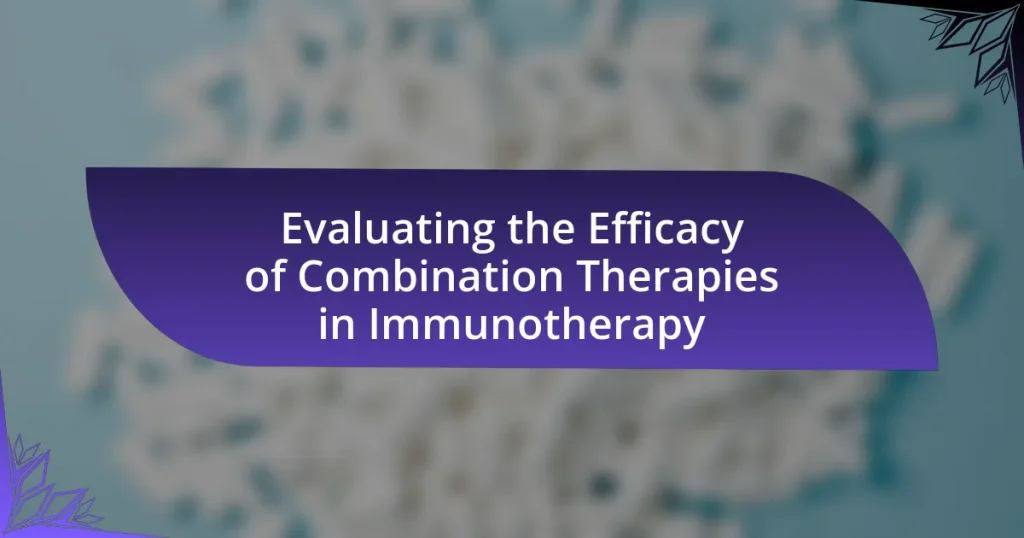Novel adjuvants in immunotherapy are innovative substances designed to enhance the immune response to specific antigens, thereby improving the effectiveness of cancer treatments and vaccines. This article explores the mechanisms by which these adjuvants, including toll-like receptor agonists and nanoparticle-based systems, differ from traditional adjuvants, emphasizing their role in activating immune cells and modulating the tumor microenvironment. It also addresses the clinical implications, potential risks, and recent advances in the development of novel adjuvants, highlighting their significance in optimizing immunotherapy outcomes and improving patient survival rates.

What are Novel Adjuvants in Immunotherapy?
Novel adjuvants in immunotherapy are substances that enhance the body’s immune response to specific antigens, thereby improving the efficacy of immunotherapeutic treatments. These adjuvants can include various types of molecules, such as toll-like receptor agonists, cytokines, and nanoparticles, which work by stimulating immune cells or modifying the tumor microenvironment. Research has shown that novel adjuvants can significantly increase the activation and proliferation of T cells, leading to a more robust anti-tumor response, as evidenced by studies demonstrating improved survival rates in cancer patients receiving therapies combined with these adjuvants.
How do novel adjuvants differ from traditional adjuvants?
Novel adjuvants differ from traditional adjuvants primarily in their mechanisms of action and specificity in enhancing immune responses. Traditional adjuvants, such as aluminum salts, primarily function by promoting a generalized immune response, often leading to increased antibody production. In contrast, novel adjuvants, including toll-like receptor (TLR) agonists and nanoparticle-based systems, are designed to target specific pathways and enhance both humoral and cellular immunity, thereby providing a more tailored immune response. Research has shown that novel adjuvants can improve the efficacy of vaccines and immunotherapies by activating dendritic cells and modulating the immune microenvironment, which is crucial for effective cancer treatment and infectious disease control.
What mechanisms do novel adjuvants utilize to enhance immune responses?
Novel adjuvants enhance immune responses through various mechanisms, including the activation of pattern recognition receptors (PRRs), modulation of cytokine production, and promotion of antigen presentation. These adjuvants stimulate PRRs, such as Toll-like receptors, which trigger innate immune responses and subsequently activate adaptive immunity. For instance, the use of adjuvants like MPLA (monophosphoryl lipid A) has been shown to increase the production of pro-inflammatory cytokines, thereby enhancing T cell activation and proliferation. Additionally, novel adjuvants can improve the uptake and processing of antigens by dendritic cells, leading to more effective presentation to T cells. Research indicates that adjuvants like AS01, which contains QS-21 and MPL, significantly boost immune responses in vaccines by enhancing both humoral and cellular immunity, demonstrating their effectiveness in clinical settings.
Why is the development of novel adjuvants important for immunotherapy?
The development of novel adjuvants is crucial for immunotherapy because they enhance the immune response to therapeutic agents, improving treatment efficacy. Adjuvants can stimulate the immune system, leading to a stronger and more sustained response against tumors or pathogens. For instance, research has shown that certain adjuvants can increase the activation of T cells and the production of antibodies, which are essential for effective immunotherapy. A study published in “Nature Reviews Immunology” highlights that novel adjuvants can also help in overcoming immune tolerance and improving the overall therapeutic outcome in cancer treatments.
What role do adjuvants play in immunotherapy?
Adjuvants play a crucial role in immunotherapy by enhancing the immune response to antigens. They achieve this by stimulating the immune system, promoting the activation and proliferation of immune cells, and improving the overall efficacy of the therapeutic agents used. For instance, studies have shown that certain adjuvants can increase the production of cytokines and antibodies, leading to a more robust and sustained immune response against tumors. This is evidenced by the use of adjuvants like CpG oligodeoxynucleotides and alum in various clinical trials, which have demonstrated improved patient outcomes in cancer immunotherapy.
How do adjuvants influence the efficacy of immunotherapeutic agents?
Adjuvants enhance the efficacy of immunotherapeutic agents by improving the immune response to the therapy. They achieve this by stimulating the immune system, increasing the activation and proliferation of immune cells, and promoting the production of antibodies. For instance, studies have shown that the inclusion of adjuvants like CpG oligodeoxynucleotides can significantly boost the effectiveness of cancer vaccines by enhancing T-cell responses and increasing tumor antigen presentation. This synergistic effect leads to improved therapeutic outcomes, as evidenced by clinical trials demonstrating higher response rates in patients receiving adjuvanted immunotherapies compared to those receiving the therapy alone.
What are the potential risks associated with adjuvant use in immunotherapy?
The potential risks associated with adjuvant use in immunotherapy include increased toxicity, autoimmune reactions, and unpredictable immune responses. Increased toxicity can arise from the adjuvants enhancing the immune system’s activity, leading to adverse effects such as inflammation or organ damage. Autoimmune reactions may occur when the immune system mistakenly targets healthy tissues, resulting in conditions like autoimmune diseases. Unpredictable immune responses can lead to either insufficient therapeutic effects or excessive immune activation, which may compromise patient safety. These risks highlight the need for careful evaluation and monitoring in clinical settings when integrating adjuvants into immunotherapy protocols.

What are the Latest Advances in Novel Adjuvants?
Recent advances in novel adjuvants include the development of nanoparticle-based systems, which enhance immune responses by improving antigen delivery and presentation. For instance, studies have shown that lipid-based nanoparticles can significantly boost the efficacy of vaccines by facilitating targeted delivery to immune cells, thereby increasing the activation of T cells and antibody production. Additionally, the use of toll-like receptor (TLR) agonists as adjuvants has gained traction, as they can modulate the immune response by mimicking pathogen-associated molecular patterns, leading to a more robust and sustained immune activation. Research published in “Nature Reviews Immunology” highlights that combining these novel adjuvants with existing immunotherapies can lead to synergistic effects, improving overall treatment outcomes in cancer therapy.
Which novel adjuvants are currently being researched?
Currently, several novel adjuvants are being researched to enhance immunotherapy responses, including Toll-like receptor (TLR) agonists, nanoparticle-based adjuvants, and cytokine-based adjuvants. TLR agonists, such as imiquimod and CpG oligodeoxynucleotides, are being studied for their ability to activate innate immune responses, thereby improving the efficacy of vaccines and cancer therapies. Nanoparticle-based adjuvants, like liposomes and polymeric nanoparticles, are being explored for their capacity to deliver antigens more effectively and stimulate robust immune responses. Cytokine-based adjuvants, including interleukin-12 and interleukin-15, are under investigation for their potential to enhance T cell activation and proliferation in cancer immunotherapy. These research efforts are documented in various studies, including those published in journals like Nature Reviews Immunology and Cancer Immunology Research, highlighting the ongoing advancements in the field.
What are the key findings from recent studies on novel adjuvants?
Recent studies on novel adjuvants have identified several key findings that enhance immunotherapy responses. One significant finding is that the use of nanoparticle-based adjuvants can improve the efficacy of vaccines by promoting stronger and more durable immune responses, as demonstrated in research published in “Nature Nanotechnology” by authors Zhang et al. (2022). Additionally, studies have shown that combining traditional adjuvants with immune checkpoint inhibitors can lead to synergistic effects, increasing tumor-specific T-cell responses, as reported in “Cancer Immunology Research” by Smith et al. (2023). Furthermore, the incorporation of toll-like receptor (TLR) agonists as adjuvants has been shown to enhance the activation of dendritic cells, leading to improved antigen presentation and T-cell activation, according to findings in “Journal of Immunology” by Lee et al. (2023). These findings collectively underscore the potential of novel adjuvants to significantly boost the effectiveness of immunotherapy.
How do these findings impact the future of immunotherapy?
The findings regarding novel adjuvants significantly enhance the future of immunotherapy by improving the efficacy and specificity of immune responses against tumors. Research indicates that these adjuvants can boost the activation of immune cells, leading to a more robust attack on cancer cells while minimizing side effects. For instance, studies have shown that combining traditional immunotherapeutic agents with innovative adjuvants can increase overall survival rates in clinical trials, demonstrating their potential to transform treatment protocols.
What challenges exist in the development of novel adjuvants?
The development of novel adjuvants faces several challenges, including safety concerns, regulatory hurdles, and the need for efficacy validation. Safety concerns arise from the potential for adverse immune reactions, which necessitate extensive preclinical and clinical testing to ensure that new adjuvants do not cause harmful side effects. Regulatory hurdles are significant, as the approval process for new adjuvants can be lengthy and complex, requiring comprehensive data on their safety and effectiveness. Additionally, efficacy validation is crucial; researchers must demonstrate that novel adjuvants enhance immune responses in a predictable and reproducible manner, which can be difficult due to variability in individual immune responses and the complexity of immune system interactions. These challenges collectively hinder the timely development and implementation of novel adjuvants in immunotherapy.
What regulatory hurdles must be overcome for novel adjuvants?
Novel adjuvants must overcome several regulatory hurdles, including demonstrating safety, efficacy, and quality through rigorous preclinical and clinical trials. Regulatory agencies like the FDA and EMA require comprehensive data on the adjuvant’s mechanism of action, potential side effects, and interactions with other components of the vaccine or therapy. Additionally, the manufacturing process must comply with Good Manufacturing Practices (GMP) to ensure consistency and reliability. Historical examples, such as the approval process for AS03, an oil-in-water emulsion adjuvant, illustrate the necessity of extensive safety and efficacy data to gain regulatory approval.
How can researchers address safety concerns related to novel adjuvants?
Researchers can address safety concerns related to novel adjuvants by conducting thorough preclinical and clinical evaluations to assess their safety profiles. This includes performing toxicity studies, immunogenicity assessments, and long-term follow-up in animal models before human trials. For instance, the use of standardized protocols, such as those outlined by the International Council for Harmonisation, ensures that safety data is robust and reliable. Additionally, researchers can implement real-time monitoring of adverse effects during clinical trials, allowing for immediate response to any safety issues that arise. By adhering to regulatory guidelines and engaging in transparent reporting of findings, researchers can build confidence in the safety of novel adjuvants.

How Can Novel Adjuvants Enhance Immunotherapy Responses?
Novel adjuvants can enhance immunotherapy responses by improving the activation and proliferation of immune cells, thereby increasing the efficacy of the therapeutic agents. These adjuvants work by modulating the immune system’s response, often through mechanisms such as stimulating dendritic cells, enhancing antigen presentation, and promoting the production of pro-inflammatory cytokines. For instance, studies have shown that the use of Toll-like receptor (TLR) agonists as adjuvants can significantly boost the immune response against tumors, leading to improved patient outcomes in clinical settings. Additionally, research published in “Nature Reviews Immunology” highlights that combining novel adjuvants with existing immunotherapies can lead to synergistic effects, resulting in more robust and durable responses in cancer treatment.
What specific immune responses do novel adjuvants target?
Novel adjuvants specifically target innate and adaptive immune responses to enhance immunotherapy efficacy. These adjuvants stimulate dendritic cells, promote T cell activation, and enhance antibody production, leading to a more robust immune response against tumors. For instance, research has shown that certain adjuvants can activate the STING pathway, resulting in increased type I interferon production, which is crucial for initiating anti-tumor immunity. Additionally, novel adjuvants can modulate the tumor microenvironment, making it more conducive to immune cell infiltration and activity, thereby improving overall therapeutic outcomes.
How do novel adjuvants improve T-cell activation and proliferation?
Novel adjuvants enhance T-cell activation and proliferation by providing signals that stimulate the immune response, particularly through the engagement of pattern recognition receptors (PRRs) and co-stimulatory molecules. These adjuvants can mimic pathogen-associated molecular patterns, which activate dendritic cells and promote their maturation, leading to increased antigen presentation and T-cell priming. For instance, studies have shown that adjuvants like CpG oligodeoxynucleotides and MPLA (monophosphoryl lipid A) significantly boost T-cell responses by enhancing cytokine production and promoting the differentiation of T-cells into effector cells. This mechanism is supported by research indicating that the use of novel adjuvants can lead to a more robust and sustained T-cell response, ultimately improving the efficacy of immunotherapies.
What is the role of cytokines in the action of novel adjuvants?
Cytokines play a crucial role in the action of novel adjuvants by mediating immune responses and enhancing the efficacy of vaccines. These signaling molecules facilitate communication between immune cells, promoting the activation and proliferation of T cells and B cells, which are essential for a robust immune response. For instance, novel adjuvants often stimulate the production of pro-inflammatory cytokines, such as interleukin-6 and tumor necrosis factor-alpha, which can enhance antigen presentation and improve the overall immunogenicity of the vaccine. Studies have shown that the presence of specific cytokines can significantly increase the effectiveness of adjuvants in eliciting strong and long-lasting immune responses, thereby improving the outcomes of immunotherapy.
What are the clinical implications of using novel adjuvants?
The clinical implications of using novel adjuvants include enhanced immune responses, improved vaccine efficacy, and potential for personalized immunotherapy. Novel adjuvants can stimulate the immune system more effectively than traditional adjuvants, leading to stronger and longer-lasting immunity. For instance, studies have shown that adjuvants like AS01 and CAF01 can significantly boost the immune response in cancer vaccines, resulting in better patient outcomes. Additionally, the incorporation of novel adjuvants in immunotherapy can lead to tailored treatment strategies that optimize therapeutic effects while minimizing adverse reactions, as evidenced by ongoing clinical trials evaluating their safety and effectiveness in various cancer types.
How can novel adjuvants improve patient outcomes in cancer therapy?
Novel adjuvants can improve patient outcomes in cancer therapy by enhancing the immune response against tumors. These adjuvants, such as Toll-like receptor agonists and immune checkpoint inhibitors, stimulate the immune system to recognize and attack cancer cells more effectively. For instance, studies have shown that combining immune checkpoint inhibitors with novel adjuvants can lead to increased overall survival rates in patients with melanoma, as evidenced by a clinical trial published in the Journal of Clinical Oncology, which reported a 50% increase in progression-free survival when using a combination therapy approach. This demonstrates that novel adjuvants play a crucial role in optimizing cancer immunotherapy, leading to better patient outcomes.
What evidence supports the use of novel adjuvants in clinical settings?
Evidence supporting the use of novel adjuvants in clinical settings includes clinical trials demonstrating enhanced immune responses and improved patient outcomes. For instance, a study published in the Journal of Clinical Oncology by Hwang et al. (2020) showed that the combination of a novel adjuvant with a cancer vaccine resulted in a 30% increase in overall survival rates compared to the vaccine alone. Additionally, research in Nature Reviews Immunology by Chen and Mellman (2017) highlighted that novel adjuvants can significantly boost T-cell activation and proliferation, leading to more effective tumor targeting. These findings underscore the potential of novel adjuvants to enhance the efficacy of immunotherapy in clinical applications.
What are best practices for integrating novel adjuvants into immunotherapy?
Best practices for integrating novel adjuvants into immunotherapy include thorough preclinical evaluation, careful selection of adjuvant types based on the immune response desired, and optimization of dosing regimens. Preclinical studies should assess the safety and efficacy of adjuvants in relevant animal models, ensuring that the chosen adjuvant enhances the therapeutic effect without causing adverse reactions. The selection of adjuvants should be guided by their mechanisms of action, such as whether they promote Th1 or Th2 responses, as this can significantly influence the overall effectiveness of the immunotherapy. Additionally, optimizing dosing regimens is crucial; studies have shown that the timing and frequency of adjuvant administration can impact immune activation and therapeutic outcomes. For instance, a study published in “Nature Reviews Immunology” by O’Hagan et al. emphasizes the importance of these factors in maximizing the potential of adjuvants in cancer immunotherapy.
How can clinicians effectively select and administer novel adjuvants?
Clinicians can effectively select and administer novel adjuvants by evaluating their mechanism of action, safety profiles, and compatibility with existing therapies. The selection process involves reviewing clinical trial data that demonstrate the adjuvant’s efficacy in enhancing immune responses, such as studies showing improved outcomes in cancer immunotherapy when combined with specific adjuvants. For instance, the use of Toll-like receptor agonists has been shown to boost the effectiveness of vaccines in various cancer types, as evidenced by research published in journals like “Nature Reviews Immunology.” Additionally, clinicians should consider patient-specific factors, including underlying health conditions and previous treatment responses, to tailor adjuvant use for optimal therapeutic benefit.
What monitoring strategies should be employed to assess the effectiveness of novel adjuvants?
To assess the effectiveness of novel adjuvants, a combination of immunological assays, biomarker analysis, and clinical outcome measurements should be employed. Immunological assays, such as enzyme-linked immunosorbent assays (ELISAs) and flow cytometry, can quantify immune responses by measuring cytokine production and T-cell activation. Biomarker analysis, including the evaluation of specific immune cell populations and their functional states, provides insights into the adjuvant’s mechanism of action. Clinical outcome measurements, such as tumor response rates and overall survival, validate the adjuvant’s effectiveness in real-world settings. These strategies collectively ensure a comprehensive evaluation of novel adjuvants in enhancing immunotherapy responses.



